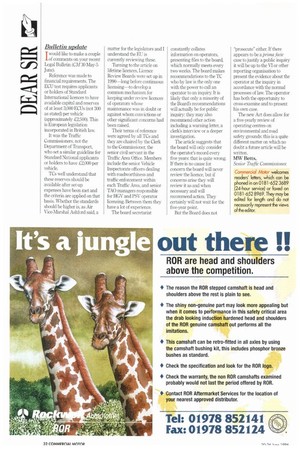Bulletin update
Page 34

If you've noticed an error in this article please click here to report it so we can fix it.
Iwould like to make a couple of comments on your recent Legal Bulletin (CM 30 May-5 June).
Reference was made to financial requirements. The ECU test requires applicants or holders of Standard International licences to have available capital and reserves of at least 3,000 ECUs (not 300 as stated) per vehicle (approximately Z2,500). This is European legislation incorporated in British law.
It was the Traffic Commissioners, not the Department of Transport, who set a similar guideline for Standard National applicants or holders to have £2,000 per vehicle.
TCs well understand that these reserves should be available after set-up
expenses have been met and the criteria are applied on that basis. Whether the standards should be higher is, as Air Vice-Marshal Ashford said, a matter for the legislators and I understand the EU is currently reviewing these.
Turning to the article on lifetime licences, Licence Review Boards were set up in 1990—long before continuous licensing—to develop a common mechanism for keeping under review licences of operators whose maintenance was in doubt or against whom convictions or other significant concerns had been raised.
Their terms of reference were agreed by all TCs and they are chaired by the Clerk to the Commissioner, the senior civil servant in the Traffic Area Office. Members include the senior Vehicle Inspectorate officers dealing with roadworthiness and traffic enforcement within each Traffic Area, and senior TAO managers responsible for HGV and PSV operator licensing. Between them they have a lot of experience.
The board secretariat
constantly collates information on operators, presenting files to the board, which normally meets every two weeks. The board makes recommendations to the TC who by law is the only one with the power to call an operator to an inquiry It is likely that only a minority of the Board's recommendations will actually be for public inquiry: they may also recommend other action including a warning letter, a clerk's interview or a deeper investigation.
The article suggests that the board will only consider the operator's record every five years: that is quite wrong. If there is no cause for concern the board will never review the licence, but if come' us arise they will review it as and when necessary and will recommend action. They certainly will not wait for the five-year point.
But the Board does not
"prosecute" either. If there appears to be a prima facie case to justify a public inquiry it will be up to the VI or other reporting organisation to present the evidence about the operator at the inquiry in accordance with the normal processes of law. The operator has both the opportunity to cross-examine and to present his own case.
The new Act does allow for a five-yearly review of operating centres on environmental and road safety grounds: this is a quite different matter on which no doubt a future article will be written.
MW Betts, Senior Traffic Commissioner
















































































































